Historic framework agreed to protect & restore nature… and ecocide law could keep it on track
The Stop Ecocide International team, along with host nation team Stop Ecocide Canada have returned from a busy fortnight in Montreal at COP15 of the Convention on Biological Diversity (CBD).
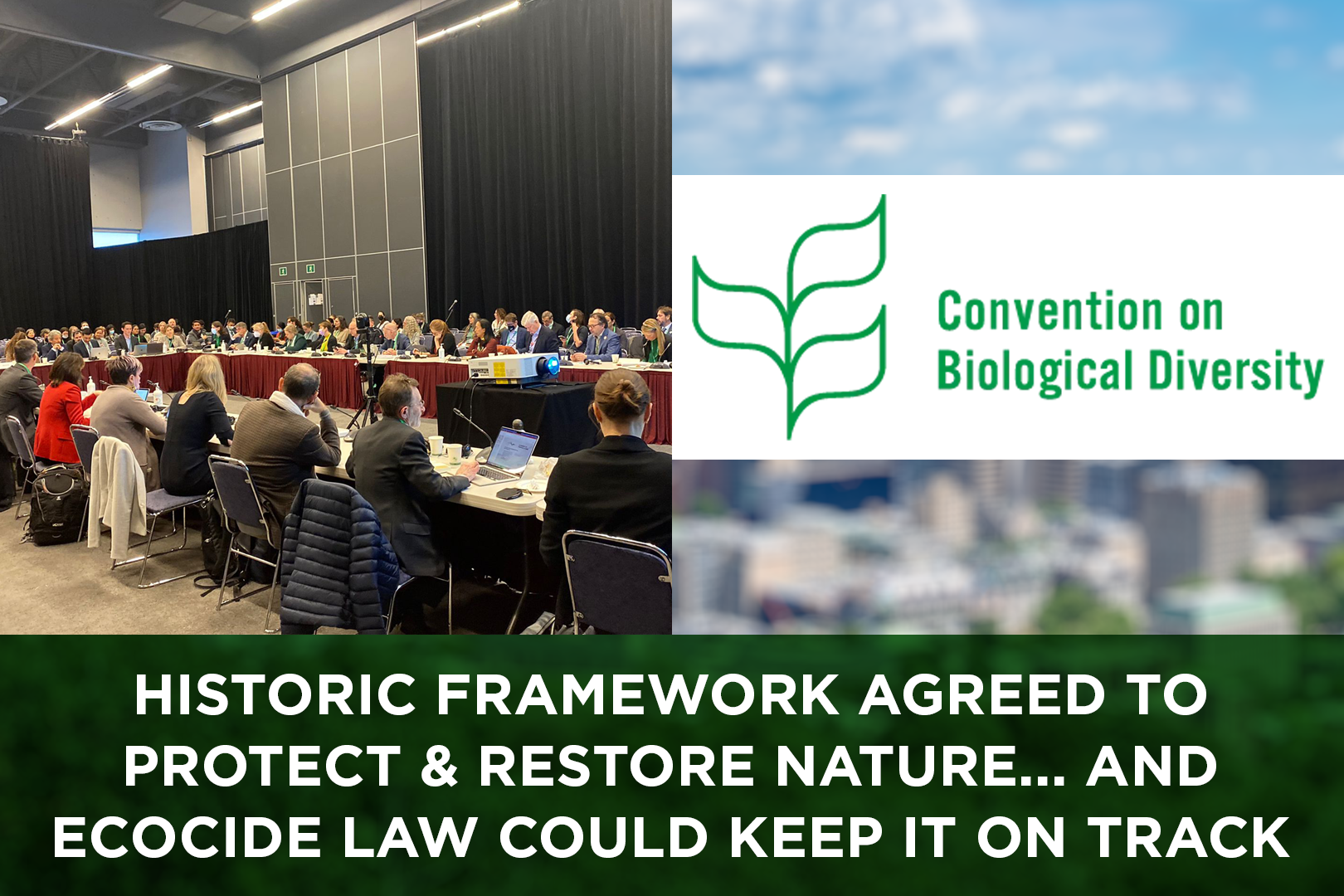
The Stop Ecocide International team, along with host nation team Stop Ecocide Canada have returned from a busy fortnight in Montreal at COP15 of the Convention on Biological Diversity (CBD).
We welcome the Kunming-Montreal Global Biodiversity Framework that has been agreed, in particular the importance given to the knowledge, rights and practices of indigenous and local communities throughout the document, as well as acknowledgement of the rights of nature.
Now comes the task of actually implementing what has been agreed. To enable states and non-state actors to be able to do what this agreement says they need to action, putting in place the correct criminal law frameworks at the international level will be profoundly helpful. Specifically, naming the worst harms to nature as crimes - ecocide - will provide an essential outer boundary and guardrail for economic activity and policy strategy.
See the Stop Ecocide Foundation’s official statement HERE - and shortly on the CBD website.
Triodos Bank calls for introduction of crime of ecocide at the International Criminal Court
In a press release issued during COP15, Triodos Bank has called for ambitious biodiversity targets and for the introduction of a new crime of ecocide at the International Criminal Court (ICC).
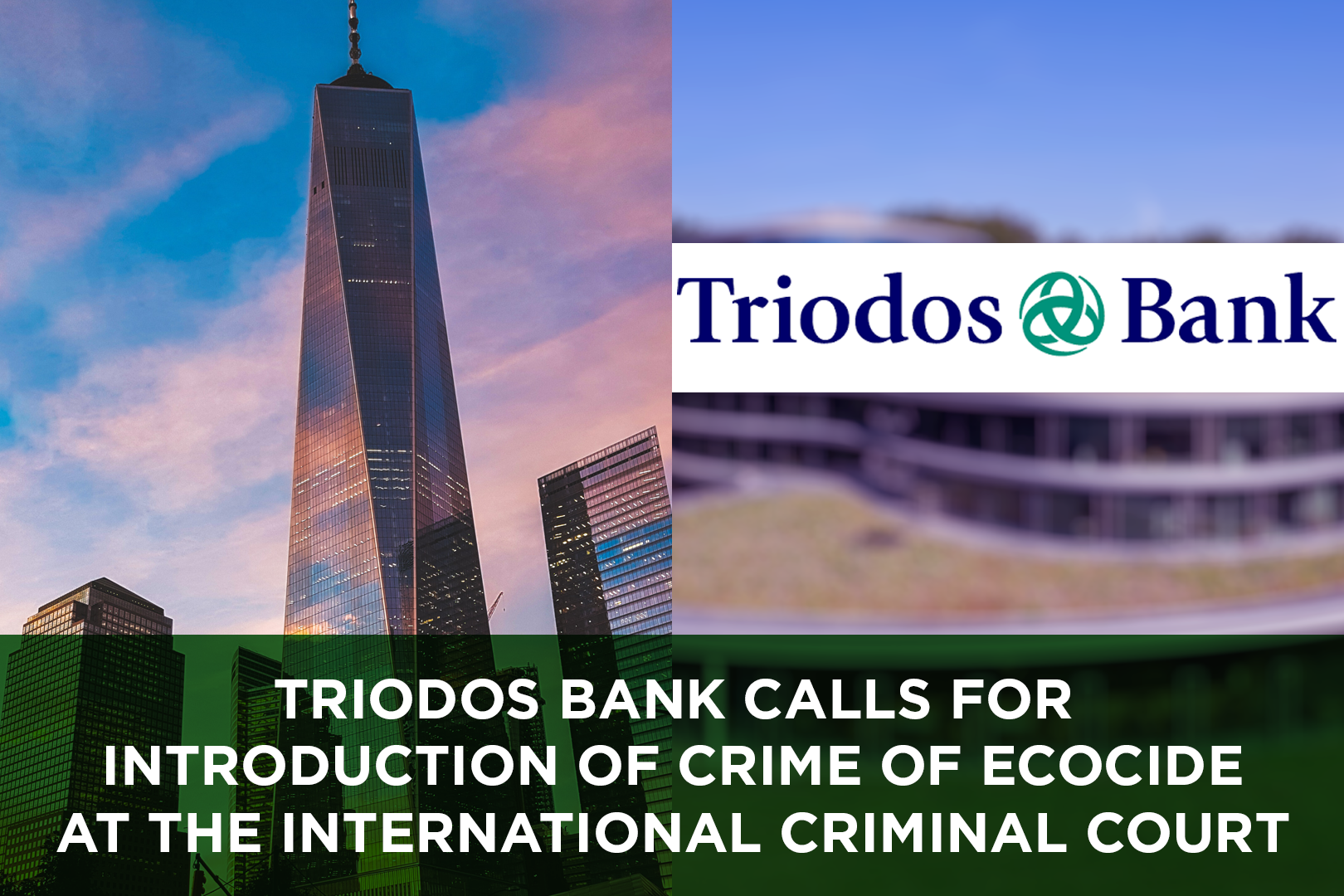
In a press release issued during COP15, the UN Biodiversity Conference taking place in Montréal, Triodos Bank has called for ambitious biodiversity targets and for the introduction of a new crime of ecocide at the International Criminal Court (ICC). Triodos has also signed Stop Ecocide International’s Business Open Letter urging governments to support the recognition of ecocide at the ICC and to engage positively in the growing global conversation to make this a reality. They also note that there is currently an opportunity to include ecocide in the EU Environmental Crime Directive.
In its release Triodos says: “It is essential to address the underlying political, economic and cultural drivers of biodiversity loss, mechanisms that encourage an extractive use of resources and a detrimental relationship with nature. To make this shift, Triodos Bank is supportive of introducing ecocide at the International Criminal Court.”
Triodos joins a growing number of businesses and corporations calling for the criminalisation of acts wantonly or illegally causing severe and either widespread or long-term damage to the environment - ecocide.
Stop Ecocide Foundation at the 21st Session of the Assembly of States Parties (ASP)
Stop Ecocide Foundation was at the 21st Session of the Assembly of States Parties
to the Rome Statute of the International Criminal Court, The Hague, 5th-10th December 2022.
SEF & SEI at COP 15 Montréal
Stop Ecocide International, our Foundation and Stop Ecocide Canada, had a very strong presence at COP15 in Montréal during December 2022.
Further EU Committees vote to recognise crime of ecocide
Support keeps on growing for the recognition of ecocide within the EU Directive on protection of the environment through criminal law. Two more EU committees, the Petitions Committee (“PETI”) and the Development Committee (“DEVE”) voted this week on proposals for the directive which is currently under revision, both backed inclusion of a crime of ecocide.
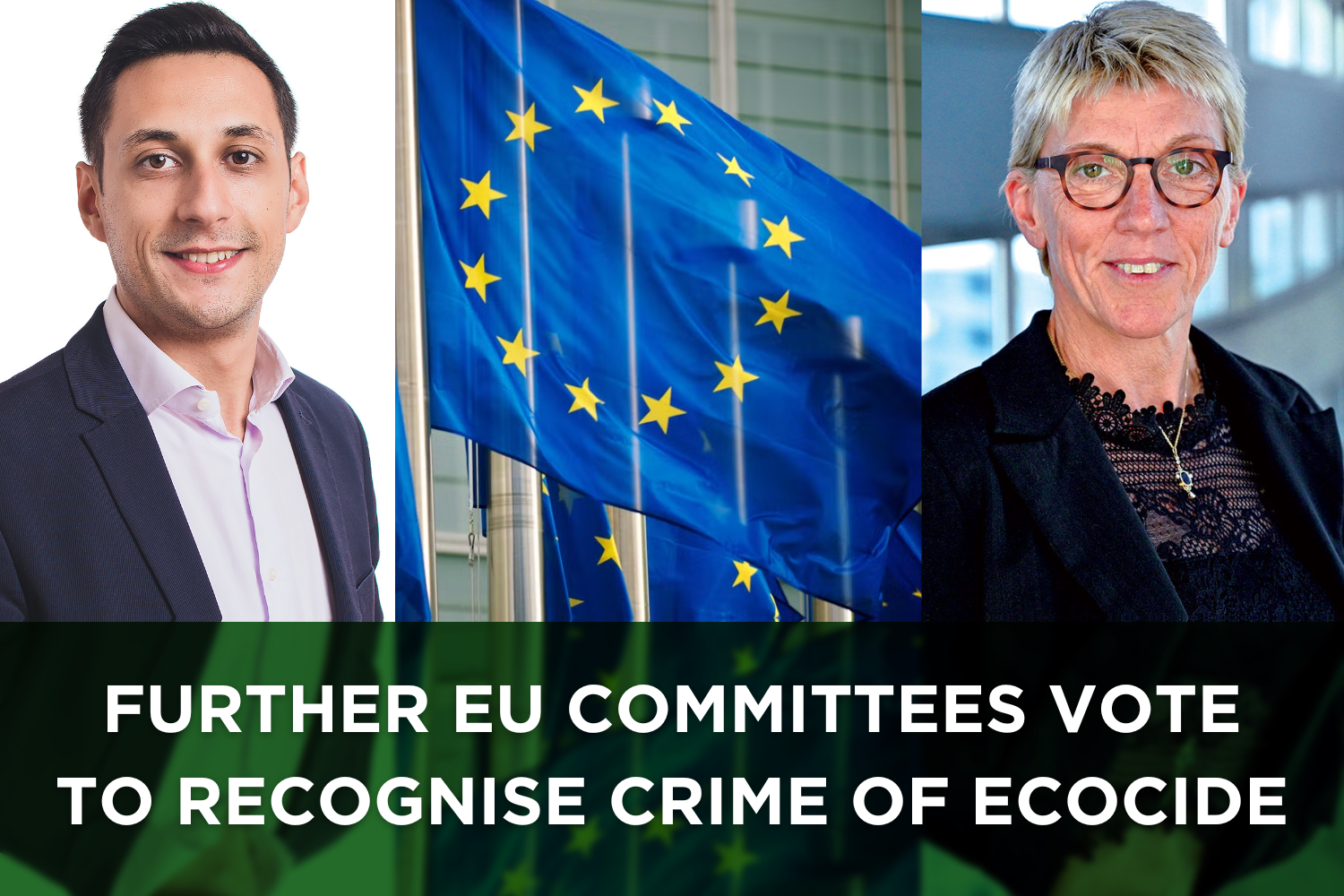
Support keeps on growing for the recognition of ecocide within the EU Directive on protection of the environment through criminal law. Two more EU committees, the Petitions Committee (“PETI”) and the Development Committee (“DEVE”) voted this week on proposals for the directive which is currently under revision, both backed inclusion of a crime of ecocide.
The wording voted for in the committees was as follows:
Petitions committee, rapporteur Caroline Roose MEP (Greens/EFA):
“‘ecocide’ means unlawful or wanton acts committed with knowledge that there is a substantial likelihood of severe and either widespread or long-term damage to the environment being caused by these acts;”
Development committee, rapporteur Vlad Gheorghe MEP (Renew Europe):
“Member States shall introduce in their national law a crime of ecocide, which shall be considered a serious criminal offence for the purposes of this Directive and shall be defined as unlawful or wanton acts committed with knowledge that there is a substantial likelihood of severe and widespread or long-term damage to the environment being caused.”
There are still votes to come early next year in the Civil Liberties, Justice & Home Affairs committee (“LIBE”) and most importantly the Legal Affairs committee (“JURI”) before the text is voted on in plenary session in the spring.
This week’s votes help to build momentum and to show how seriously the issue of recognising ecocide is being taken at the EU level.
Council of Europe to draft new environmental crimes convention
The Council of Europe has announced that its Committee of Ministers yesterday adopted the Terms of Reference of the Committee of Experts on the Protection of the Environment through Criminal Law (PC-ENV), which has been established to draft a new Convention on the Protection of the Environment through Criminal Law.
The following explanatory paragraphs is taken from the CoE release: “The new Council of Europe Convention will provide a common global framework, laying down a general basis of pan-European criminal law, in line with the transboundary nature of the environmental challenge that needs to be met.

The Council of Europe has announced that its Committee of Ministers yesterday adopted the Terms of Reference of the Committee of Experts on the Protection of the Environment through Criminal Law (PC-ENV), which has been established to draft a new Convention on the Protection of the Environment through Criminal Law.
The following explanatory paragraphs are taken from the CoE release:
“With the acceleration of degradation phenomena (climate change, erosion of biodiversity, depletion of natural resources, destruction of habitats, etc.), the environmental issues and offences have evolved, including organised crime on a transnational scale. According to INTERPOL and the United Nations Environment Programme (UNEP), environmental crime is estimated as the world’s fourth-largest criminal enterprise, with criminals exploiting the differences in approaches taken by countries. “What may constitute a crime in one country, may not in another, effectively enabling criminals to go ‘forum shopping’”, resulting in lasting damage and degradation.
“The new Council of Europe Convention will provide a common global framework, laying down a general basis of pan-European criminal law, in line with the transboundary nature of the environmental challenge that needs to be met.
BACKGROUND TO THE PC-ENV:
“In June 2022, the Steering Committee of the Council of Europe for overseeing and coordinating activities in the field of crime prevention and crime control – the European Committee on Crime Problems (CDPC), decided that drafting a new Convention was feasible and appropriate, following a Feasibility Study (for further information: CDPC_Environment). Subsequently, the PC-ENV under the authority of the Committee of Ministers and the CDPC will begin its work on the new global Convention in early 2023.”
SEF & SEI at COP 27
We were delighted that Stop Ecocide International, and our Stop Ecocide Foundation, had a very strong presence during COP27 in November 2022.
"Countering ecocide" key point in Zelensky's peace formula for Ukraine
At the G20 summit in Indonesia, President Volodymyr Zelenskyy of Ukraine set out in a speech to world leaders a 10-point Peace Formula aimed at restoring just and long-lasting peace for Ukraine. Covering nuclear safety, food and energy security, ceasing of hostilities and the upholding of the UN Charter, the formula also specifically includes a call for immediate protection of the environment. In Zelenskyy’s words: “The eighth challenge is ecocide, the need for immediate protection of environment. [....]”
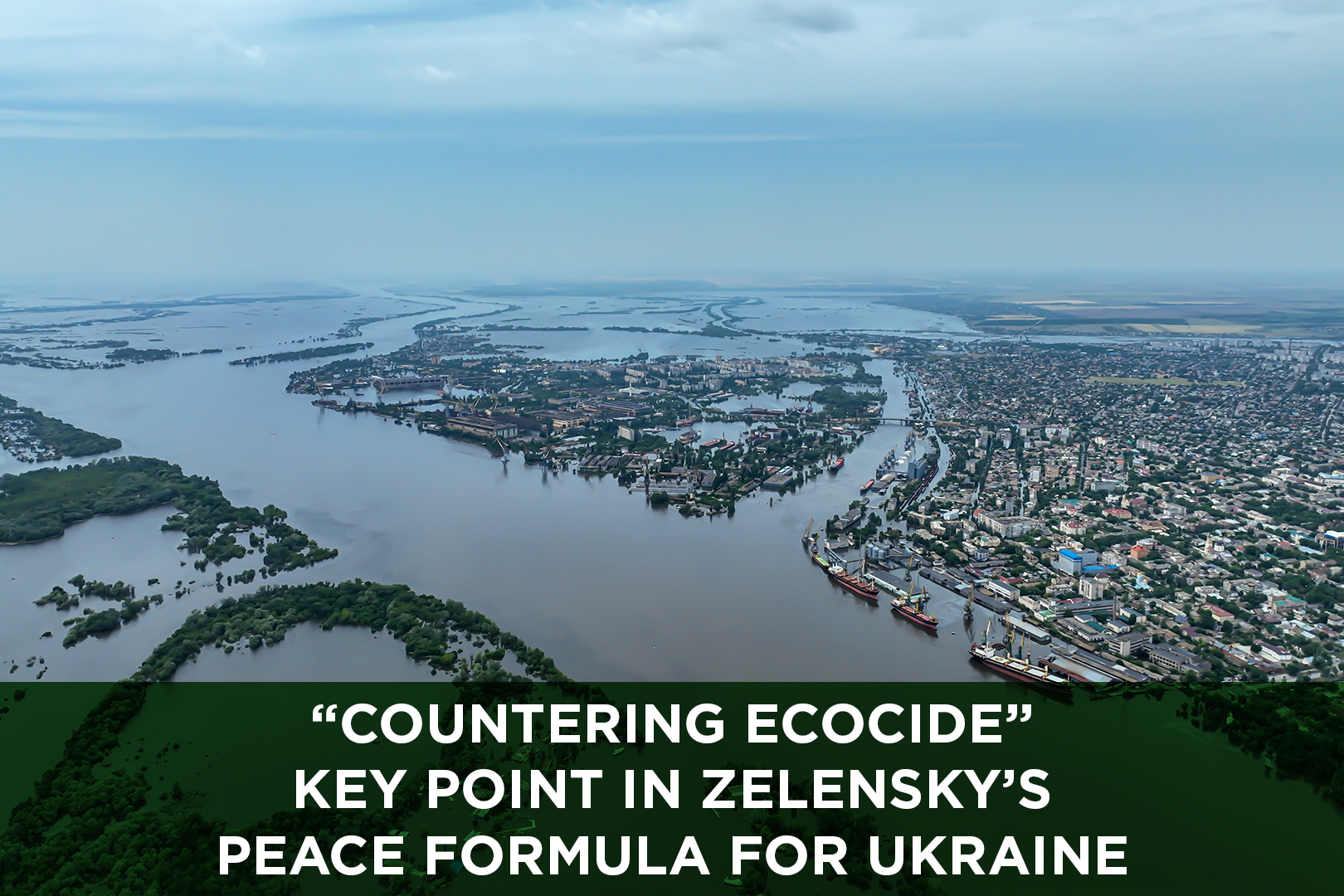
At the G20 summit in Indonesia, President Volodymyr Zelenskyy of Ukraine set out in a speech to world leaders a 10-point Peace Formula aimed at restoring just and long-lasting peace for Ukraine. Covering nuclear safety, food and energy security, ceasing of hostilities and the upholding of the UN Charter, the formula also specifically includes a call for immediate protection of the environment. In Zelenskyy’s words:
“The eighth challenge is ecocide, the need for immediate protection of environment. [....]
“It is impossible to accurately calculate the amount of atmospheric pollution from burnt oil depots and other fires... As well as from blown up sewage facilities, burned chemical plants, innumerable burial sites of slayed animals.
“Just imagine this – due to the Russian aggression, 6 million domestic animals died. 6 million! These are official numbers. At least 50,000 dolphins were killed in the Black Sea. Thousands of hectares of soil are contaminated with harmful substances - most of them are fertile soils. Were fertile soils.
[...]
“We must also find common responses to all environmental threats created by the war. Without this, there will be no return to a normal, stable life, and the reverberations of the war will remain for a long time - in the explosions of mines that will take the lives of children and adults, in the pollution of water, soil and atmosphere.
[...]
“This is not just a Ukrainian problem. This is a challenge for the whole world.”
Pope Francis repeats call for the inclusion of ecocide as a fifth crime against peace
In a letter sent to the Argentinean Association of Professors of Criminal Law (AAPDDP) and disseminated in the media, Pope Francis makes an express reference to the need to incorporate "ecocide" as a fifth category of crimes against peace, i.e. to criminalise, at the international level, those conducts that involve the loss, damage or destruction of flora and fauna.

In a letter sent to the Argentinean Association of Professors of Criminal Law (AAPDDP) and disseminated in the media, Pope Francis reflects on the important role played by experts in criminal law and calls for them to be above all "people passionate about justice, aware of the great duty they fulfil".
After commenting on human rights violations, Pope Francis makes an express reference to the need to incorporate "ecocide" as a fifth category of crimes against peace, i.e. to criminalise, at the international level, those conducts that involve the loss, damage or destruction of flora and fauna.
Pope Francis went on to say "We need jurists to debate and propose new forms of legal protection of Nature, for the human right to a healthy environment cannot be safeguarded without first safeguarding the rights of Nature. More specifically, the human right to life is meaningless if the ecosystems that sustain humanity do not have the right to exist. It is therefore indispensable to create a normative system that includes insurmountable limits and ensures the protection of ecosystems, before the new forms of power derived from the techno-economic paradigm sweep away freedom and justice".
According to Miguel Angel Asturias, Professor of Criminal Law and Environmental Crime at the University of Belgrano (Buenos Aires), and architect of a proposal to criminalise ecocide in Argentina, "Pope Francis' letter is very encouraging and should be heeded by the jurists of our country.... That is why we ask the Argentine Government, Academic Institutions, Judges and Prosecutors, Social and Environmental NGOs, defenders of the planet and all Argentines to listen to the words of Francis and take the demand to the relevant agencies to urgently include environmental crimes and ecocide in our Criminal Code of the Nation, supporting the proposal for the crime of ecocide that we from "Argentina Sin Ecocidio" have formulated, and that they also support the inclusion of ecocide as a fifth crime under the jurisdiction of the International Criminal Court."
ICGN reiterates call to governments: “Collaborate internationally to criminalise ecocide”
In its statement to COP27, the International Corporate Governance Network (ICGN), an investor-led organisation with ‘assets under management’ of $70 trillion, has, for the second year running, called on governments to criminalise ecocide.

In its statement to COP27, the International Corporate Governance Network (ICGN), an investor-led organisation with ‘assets under management’ of $70 trillion, has, for the second year running, called on governments to criminalise ecocide.
In one of the most significant public interventions to date from the corporate sector, the ICGN statement calls for a ‘just transition’ and sets out recommendations for investors, companies, governments and ‘standard setters’ to act on their ‘unique responsibilities’ to implement assertive action on climate change.
In addition to the criminalisation of ecocide, the ICGN also calls on governments to grant ‘legal personhood’ to specific ecosystems as has been achieved in Spain, Aotearoa and Bangladesh.
Belgium: government proposes adding ecocide to domestic penal code
As part of the first major revision of its criminal code in over a century the Belgian government has proposed the inclusion of a crime of ecocide into domestic law, a move championed by the Minister of Climate, Environment, Sustainable Development and Green Deal, Zakia Khattabi.

As part of the first major revision of its criminal code in over a century the Belgian government has proposed the inclusion of a crime of ecocide into domestic law, a move championed by the Minister of Climate, Environment, Sustainable Development and Green Deal, Zakia Khattabi. The new crime has been included in the federal Minister of Justice Vincent van Quickenborne’s proposed reforms of “Book 2” of the Penal Code.
The core operative text of the proposed crime has been revealed by Minister Khattabi as the following:
“deliberately committing an unlawful act causing serious, widespread and long-term damage to the environment knowing that such acts cause such damage.”
Although somewhat narrower in scope, this is clearly aligned with the international consensus legal definition of the Independent Expert Panel convened by the Stop Ecocide Foundation.
The bill (full text not yet available) will come to the Federal Parliament for discussion over the coming weeks, amendments may be motioned, and a final text will eventually be voted on.
With this bill Belgium will become the first European country to recognise ecocide as a standalone crime dealing specifically with the most severe and long-term harms to nature. This is a hugely positive development and will encourage other states both to move towards domestic legislation and also to support the initiative at the regional and international levels.
"Alongside the international dynamic, and to give it every chance of succeeding, it is important that States pave the way", Minister Khattabi declared. “I am delighted and congratulated that Belgium is among the front runners in this area. I would like to thank my colleague Vincent Van Quickenborne for the excellent collaboration in this area.”
The proposed crime was a work of collaboration between the environment and justice ministries.
Committee vote backs call to include “ecocide” in revised EU environmental crime directive
The Stop Ecocide Foundation EU Crime Directive Position Paper, submitted to EU agencies, has just been vindicated by the vote of the EU’s environment (ENVI) committee on its proposals vis-a-vis the revision of the EU Directive. The committee has proposed inclusion of a standalone article in the Directive setting out an offence of ecocide to cover “severe and either widespread or long-term damage to the environment”.
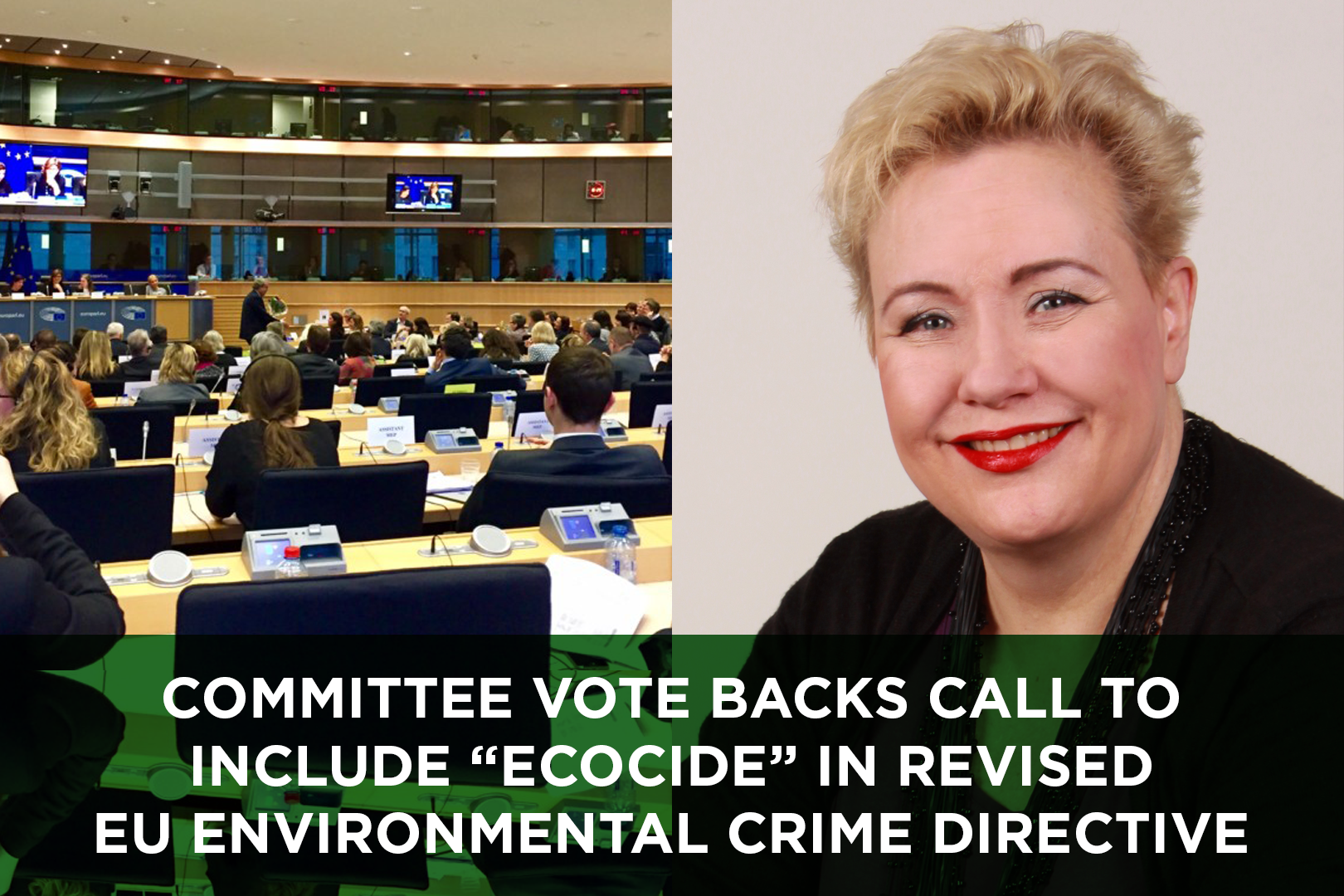
Over 200 organisations have endorsed a position paper calling for inclusion of a crime of ecocide in the revised EU Directive on protection of the environment through criminal law, an inclusion now backed by the EU's environmental affairs (ENVI) committee.
The paper, submitted to EU agencies by the Stop Ecocide Foundation, has just been vindicated by the vote of the committee on its proposals vis-a-vis the revision of the EU Directive. The committee has proposed inclusion of a standalone article in the Directive setting out an offence of ecocide to cover “severe and either widespread or long-term damage to the environment”. If adopted into the revised directive, this could enable member states to prosecute the worst environmental harms which are not specifically addressed as serious crimes in any member state at present. The EU’s economic and social committee has also endorsed the move.
Jojo Mehta, Chair of the Stop Ecocide Foundation said: “This vote is a vote for humanity’s future and the future of our precious planet. The revision of this Directive is a crucial opportunity. Ecocide is a key root cause of climate and ecological crisis. Recognising it is about getting real - it’s about recognising that when we recklessly destroy the living world that sustains us, we put everything in jeopardy: our lives, our children, the future of our own species and so many others… as those nations on the frontlines of climate and ecological breakdown already know only too well. On the other hand, when we put this legal “outer boundary” guardrail in place, we provide a foundational underpinning for protection of the environment, while also creating the enabling conditions for positive change. With the right legal framing, the innovation, creativity and investment in action we so desperately need can begin to flow in the right direction.”
She emphasised the importance of the definition of ecocide which emerged last year from an independent panel of legal experts convened by the Stop Ecocide Foundation.
“The consensus definition has become the de facto starting point for governments considering the criminalisation of ecocide, at international, regional and domestic level. Alongside the hundreds of organisations which have endorsed our paper, we urge its inclusion in this directive. For the EU to move forward with an aligned definition would show solidarity, moral leadership and practical legal action in the context of the global crisis facing us all.”
Support for an ecocide law criminalising mass damage and destruction of ecosystems is gaining momentum around the world with recorded interest from both island nations (Vanuatu, Samoa, Antigua & Barbuda, the Maldives) and European states (France, Belgium, Finland, Spain, Luxembourg, the Netherlands, Denmark). It has been endorsed by high-profile figures as diverse as the Pope, Greta Thunberg and UN Secretary-General Antonio Guterres. Belgium and Finland were the first European nations to express interest in criminalising ecocide at the International Criminal Court, and the European Parliament has now supported in principle on several occasions.
MEP Marie Toussaint, who has made it her mission to progress recognition of ecocide by the EU, is delighted:
"This is the first step of very promising negotiations in the European Parliament. Today, the Environment's committee not only asked to recognize the crime of ecocide in the European Environmental Crime Directive, it does so using the international definition of the Stop Ecocide Foundation's panel : "ecocide’ means unlawful or wanton acts committed with the knowledge that there is a substantial likelihood that those acts cause a severe and either wide-spread or long-term damage to the environment".
Discussions will now continue in other competent committees, including in the legal affairs committee, but today's vote shows that there is a political majority in the European Parliament for the recognition of ecocide.
Engaged in the Green Deal, the EU must be more ambitious in its fight against environmental crimes. This includes ending ecocides that destroy our common Earth. We cannot waste the opportunity that the revision of the Environmental Crime Directive gives us."
Patrizia Heidegger, Director for Global Policies and Sustainability, European Environmental Bureau, said:
“Environmental crime is the third largest crime category worldwide, incredibly lucrative, and undermines our environmental goals. Currently, committing environmental crimes in the EU simply pays off. Police detection is rare, effective prosecution even rarer, and judicial sentences are neither effective nor dissuasive. That needs to change. Recognising Ecocide in the Environmental Crime Directive will create a necessary prosecution tool to address the most heinous and dangerous violations of our environment. Legislators must use the revision of the directive to empower national police and prosecution services. We call for a comprehensive list of offences, strong sanctions, increased resources, and the guaranteed protection for environmental defenders who report crimes.”
Panama vice-president speaks on ecocide at UN General Assembly
In a speech to the United Nations General Assembly last September, the Vice President of the Republic of Panama, José Gabriel Carrizo, argued that "the time has come for the world to have an international body to hold accountable all those who cause damage to the planet".

In a speech to the United Nations General Assembly last September, the Vice President of the Republic of Panama, José Gabriel Carrizo, argued that "the time has come for the world to have an international body to hold accountable all those who cause damage to the planet".
In a powerful speech, after stating that Panama is a country "with a vocation for the protection of natural resources" the Vice President launched a series of key questions to the forum: "How can we earn the trust of new generations while the planet where we live and our descendants will have to live is being decimated before their eyes? How many more lives must be lost? How many more natural disasters must occur?" Finally, he asked "When is ecocide going to stop?"
He then explicitly addressed “the large emitters of gasses, those who promote deforestation, and those who dump chemicals that pollute and kill” to remind them that "it is about the survival of the Earth and the species that inhabit it".
As José Gabriel Carrizo says a little further on, "the future depends on every decision we make now. To take the wrong course and then try to correct it is no longer viable".
Watch a highlight of the speech HERE.
Watch the full video of the intervention HERE.
Companies get behind ecocide law as SEI launches its Open Business Letter
A growing number of businesses are seeing the potential benefits of the legal guardrail that an international ecocide law will afford and are joining calls to criminalise those acts which threaten the most serious environmental damage.

A growing number of businesses are seeing the potential benefits of the legal guardrail that an international ecocide law will afford and are joining calls to criminalise those acts which threaten the most serious environmental damage.
Stop Ecocide International has launched an Open Business Letter calling on governments to support the recognition of ecocide at the International Criminal Court and to engage positively in the global conversation to make this a reality.
Sophie Dembinski, Head of Public Policy at search engine Ecosia, says: “It is in the interests of the business community to ensure a healthy commercial environment, but right now, businesses spearheading sustainable practices are at a competitive disadvantage. Setting a boundary for what is legally and morally acceptable will create a level playing field for sustainable enterprise, reward those doing the right thing and create the conditions for a regenerative economic cycle in which we can all thrive.”
The team behind the United Nations Race to Zero recently launched a report, The Pivot Point, co-authored by over 40 expert organisations, which acknowledged ecocide law as a key driver for business action towards achieving Net Zero.
Read the Open Business Letter here
Read The Pivot Report here
New Race to Zero Report acknowledges ecocide law as key driver for climate action
Ecocide law has been acknowledged as a key driver for business action towards net zero in a high level report delivered at the United Nations during UN General Assembly high-level week in New York.

Ecocide law has been acknowledged as a key driver for business action towards net zero in a high level report delivered at the United Nations during UN General Assembly high-level week in New York. The launch took place at the Climate Action: Race to Zero and Race to Resilience Forum where COP26 and COP27 Climate Champions, where Nigel Topping and Dr Mahmoud Mohieldin respectively, urged leaders across business, finance, political and civil society to deliver on the climate commitments that have been made.
The forum focussed on closing the ’implementation gap’ by making sure that voluntary commitments translated into action and progress through standards and regulation.
The Pivot Point, a report co-authored by over 40 expert organisations, was launched on 21st September and contains a chapter on “the drivers and influencers of change”, dedicating a substantial section to ecocide law (Page 58). Section author Sophie Dembinski, Head of Policy for Ecosia, wrote:
“Beyond providing a much needed international legal and regulatory framework for businesses to keep pace with ambitious climate and biodiversity targets, adopting such a law would also encourage a vital shift of consciousness and unlock new opportunities with regards to how business engages with the natural living world in the long-term.”
The report gave an overview of the current voluntary client leadership activity as well as emerging standards and regulations and set out measures needed to get business on track to net zero, including aligning incentives, rewarding investment, correcting market failures, creating level playing fields and resolving confusion. It also made a call to action for all non-state actors to step up and join the Race to Zero.
As familiarity with the concept of ecocide grows, more and more businesses are seeing the potential benefits of a preventive legal guardrail, and joining calls to criminalise acts threatening the most serious environmental damage.
Read a copy of the report here
Sign our Business Open Letter here
UK Labour Party Re-affirms and strengthens its Support for Ecocide Law
Shadow Foreign Secretary, David Lammy, re-affirmed the UK Labour Party’s support for a new international law of ecocide in his speech to the Labour Party Conference on 27 September.

Shadow Foreign Secretary, David Lammy, re-affirmed the UK Labour Party’s support for a new international law of ecocide in his speech to the Labour Party Conference on 27 September.
He declared that Labour’s foreign policy would be green, stating that “we will seek to work with allies and partners to create a new international law of ecocide to criminalise the wanton and widespread destruction of the environment.”
This declaration was a strengthening of his announcement last year, whilst speaking as Shadow Justice Secretary, at an independent panel event on Ecocide Law and Climate Justice which was hosted in Glasgow during COP26 by Stop Ecocide International together with Global Witness, Client Earth and Climate Counsel. At that event, he stated that the Labour Party was committed to supporting discussions around an international crime of ecocide.
Read full speech to Labour Party Conference here
Read about statement at COP26 here
Vanuatu President Calls for Ecocide Law at UN General Assembly
President Nikenike Vurobaravu of Vanuatu has called for states to support including a crime of ecocide in the Rome Statute of the International Criminal Court (ICC), telling the UN General Assembly “acting with knowledge of severe and widespread or long-term damage to the environment can no longer be tolerated”.
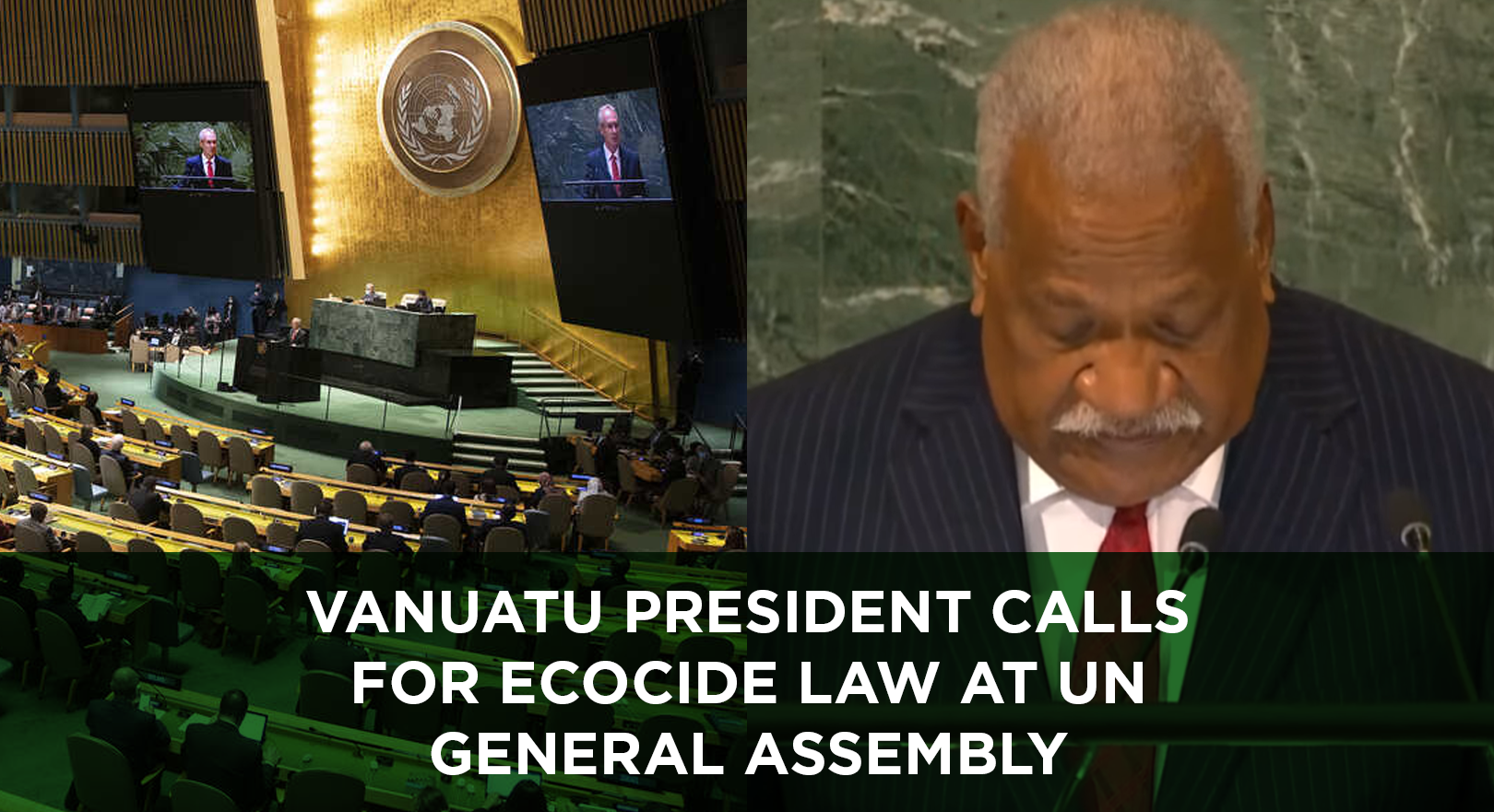
President Nikenike Vurobaravu of Vanuatu has called for states to support including a crime of ecocide in the Rome Statute of the International Criminal Court (ICC), telling the UN General Assembly “acting with knowledge of severe and widespread or long-term damage to the environment can no longer be tolerated”.
Jojo Mehta, Co-founder and Director of Stop Ecocide International said:
"It’s deeply encouraging to hear President Vurobaravu calling for recognition of ecocide at the UN. We trust he will prove to be the first Head of State among many to do so."
In the same speech, President Vurobaravu called for a first-of-its-kind global treaty to phase out the use of fossil fuels, as well as a request to the International Court of Justice (ICJ) for an Advisory Opinion on the human rights obligations of states with respect to climate change.
Vanuatu, an archipelago of about 80 islands, was the first state to call for recognition of ecocide at the ICC (December 2019), and is championing several legal approaches to climate and ecological breakdown, and has led by example in its efforts to reduce fossil fuel dependency. The carbon-negative country, rated one of the most at-risk countries for natural disasters by the UN, has set itself a target to completely stop the use of fossil fuels by 2030.
Read the full article here.
Ecocide law: one of the four key youth demands
As part of the Global Climate Strike, FFFNYC made the recognition of ecocide as an international crime one of their 4 key demands.
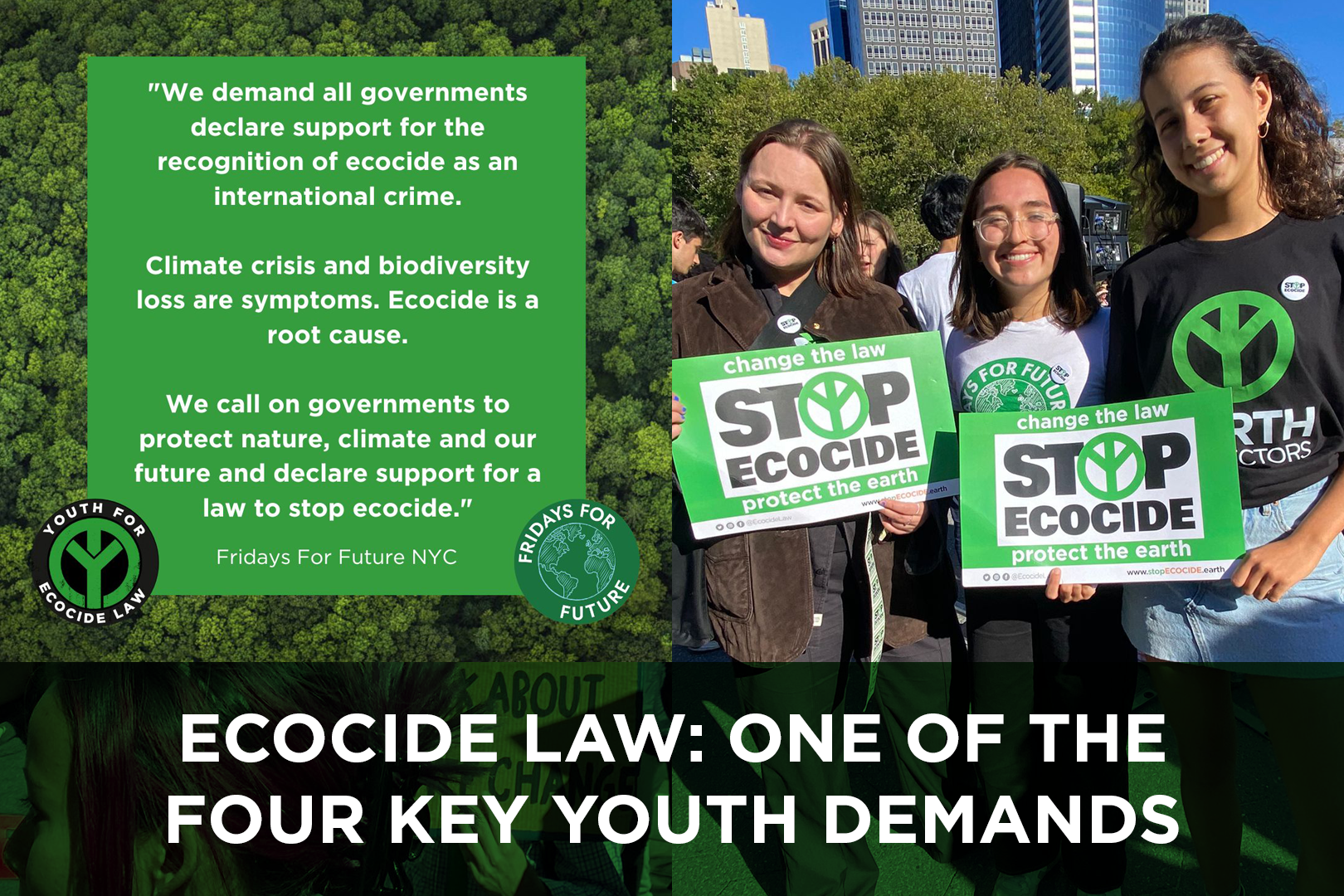
As part of the Global Climate Strike on 23rd September, Fridays for Future NYC (FFFNYC) made recognition of ecocide as an international crime, one of their 4 key demands to governments:
(4) Demand: We demand all governments declare support for the recognition of ecocide (mass damage and destruction of ecosystems) as an international crime.
Why: Climate crisis and biodiversity loss are symptoms. Ecocide is a root cause, and it will continue with impunity unless a strong legal deterrent is put in place.
What Next: We call on governments to protect nature, climate and our future and declare support for a law to stop ecocide.
On 23rd September, supporters walked to Stop Ecocide (in large part the result of collaboration between the rapidly growing Youth For Ecocide Law, Fridays for Future NYC (FFFNYC) and Stop Ecocide US Allies), as part of the Global Climate March. The march set off from Foley Square and ended in Battery Park where the crowd heard speeches by high profile indigenous and youth voices, such as Kevin Patel, Xiye Bastida and others, and Stop Ecocide US Allies, Chair, Julia Jackson (see speech here).
Our Youth For Ecocide Law co-lead, Tova Lindqvist was also on the ground connecting with FFFNYC.
Marches also took place in other cities around the world, including a key event in Toronto, led by our second Youth For Ecocide Law co-lead, Amalie Wilkinson.
You can see some social media highlights HERE.
Mar Menor lagoon: the first ecosystem in Europe to be granted legal status
The Spanish Parliament has just taken the final step to approve the law that recognises the Mar Menor and its basin as having rights, among them the right to exist and the right to recover its natural balance. The law was approved in the Senate by an overwhelming majority.

The Spanish Parliament has just taken the final step to approve the law that recognises the Mar Menor and its basin as having rights, among them the right to exist and the right to recover its natural balance. The law was approved in the Senate by an overwhelming majority.
The fact that the Mar Menor lagoon has been granted legal personhood is a historic milestone, not only because it has been a great victory for environmental defenders but because, in addition, it introduces an innovative legal concept into European law, a precedent upon which more cases are sure to follow. The continent’s largest saltwater lagoon has been suffering continuous ecocide for decades, leading to the collapse of life within it. None of the established protections, national or international, had served to halt the tragedy. Victory was achieved through massive citizen mobilization, activated through the launch of a People’s Legislative Initiative (ILP). This involved collecting over 650,000 signatures by hand across Spain, when in fact only 500,000 were needed - and all this during the pandemic. The scandalous case of the cascading deterioration of the Mar Menor and the struggle of citizens to defend it crossed national borders and was even discussed in a UN forum within its Harmony with Nature programme.
In the words of one of the architects of the ILP, lawyer Eduardo Salazar: "The final approval of the ILP of the Mar Menor is a step forward in the recognition of the rights of non-human beings, in this case, an ecosystem full of life. A citizen reaction to ecocide in order to promote pioneering legislation in Europe that could be a reference for other ecosystems in other states. The participatory and judicial aspect of the ILP aims to ensure that the citizens who promoted it, take care of its effective application".
There are already a growing number of ecosystems in the world that have been granted legal status as a way of protection, from the Atrato River in Colombia to the Whanganui River and the Taranaki Mountain in Aotearoaa-New Zealand or the Magpie River in Canada.
Granting rights is an effective tool in the protection of high-value ecosystems, but more is needed: an international criminal law to protect the natural world from the destruction it is suffering in many parts of the world. Granting rights to ecosystems and establishing laws to protect them are two sides of the same coin. It is therefore essential to advance the criminalisation of ecocide at the international level, creating a law that covers all cases of serious environmental damage that are either extensive or long-term. At the moment, we are on the right track. Today we celebrate this great victory, a huge step towards where, ethically and legally, we must go.




